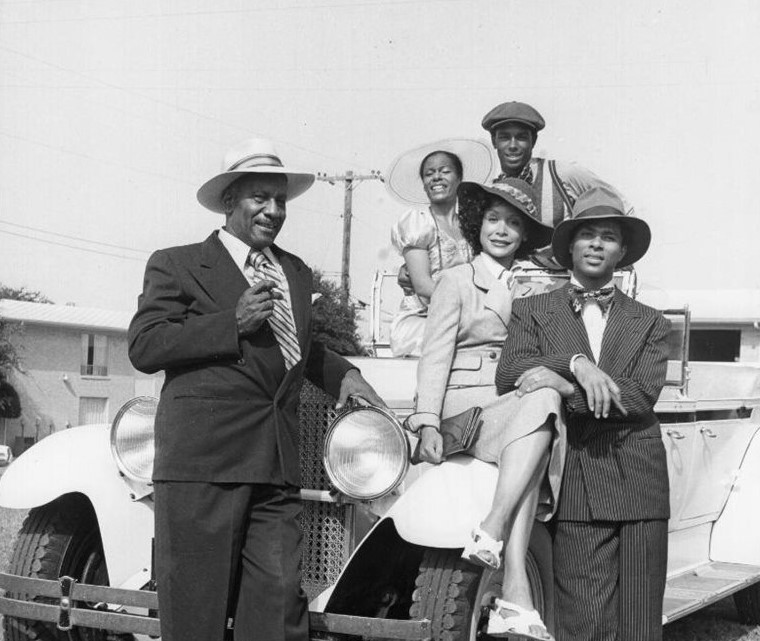Starring: Raymond St. Jacques, Philip Michael Thomas, Gilbert Greene and Freda Payne
Rated: R Crime, Drama
Set during the 1930s in Arkansas, Book of Numbers actually begins with Dave Green (Philip Michael Thomas) walking in a funeral procession a la New Orleans style. Dave, who also serves as the film’s narrator throughout, shares his regret settling in the rural community of El Dorado. From there, the storyline regresses to earlier in time when Dave and his mentor, Blueboy Harris (Raymond St. Jacques) first arrived to the small town.
The two men met when they worked as servers. After saving their money, Blueboy enacts his plan to start a numbers game in El Dorado, where he previously lived. Upon their return, he is reunited with old acquaintances, including Pigmeat Goins (Hope Clarke), and makes new friends such as Billy Bowlegs (D’Urville Martin).
Because the numbers game is illegal, Blueboy and Dave’s operation faces opposition from the local police force, which is corrupt. However, they also will have to go toe-to-toe with a branch of organized crime ran by White mob boss Luis Antoine (Gilbert Greene) as well as White domestic terrorist group, the Ku Klux Klan. They even face opposition from a Black gangster Joe Gaines (Jerry Leon) who works in collaboration with Antoine.
Operating their business in the back of a hair salon that services the Blacks in El Dorado, Blueboy and Dave are highly successful. Refusing to succumb to the extortion tactics of their newfound enemies leads to continuous violence.
Will Blueboy and Dave be able to survive their ambitious dreams … or will their “book of numbers” lead to nightmares unforeseen?
This film was based upon the novel, The Book of Numbers (1969), by African-American author Robert Deane Pharr. Filmed near Dallas, Texas, it was directed and produced by Raymond St. Jacques, who starred as Blueboy. Jacques worked diligently to get Blacks involved both onscreen and in production. Though he wanted this film to be one in a series of films presenting diverse aspects of Black life, Book of Numbers was the only film that Jacques produced and directed.
Two themes that are pronounced in this film are of double consciousness and crime. Double-consciousness, was best espoused by W.E.B. Dubois in his pioneering autoethnographic masterpiece, The Souls of Black Folk (1903). In it, the trailblazing sociologist details the internal conflict Blacks’ experience in an oppressive, White-dominated society. In Book of Numbers, this phenomena is manifested when examining the relationship of Blueboy and Dave.
In a pivotal scene, Blueboy, an elder, utilizes degrading stereotypes of speaking poorly and bowing his head in deference to a White judge. Dave, who is young, is appalled by Blueboy’s behavior. Drawing Dave’s ire, Blueboy explains that he played to the ignorance and racism of Whites so that he could be free to continue to operate their business. Dave, as a proud Black man and entrepreneur, would rather take his chance with an attorney to fight in court.
In his review, “Book of Numbers” at Roger Ebert.com, esteemed film critic Roger Ebert affirmed, “The older gangster, for example, shuffles into court as a half-paralytic Uncle Tom, and is found not guilty by the White judge. He warns the prosecutor to ‘stop persecutin’ our Negroes.’ The younger Black gangster finds his partner’s behavior reprehensible, but St. Jacques explains: ‘If I went in there with a fancy lawyer, I’d go to jail for sure.’”
The issue of crime is also featured throughout. With many African-Americans facing numerous obstacles that hinder them from legitimately attaining “The American Dream”, criminal activity seems to be one of the few opportunities left to them. Blueboy and Dave’s illegal numbers lottery not only advances their station in life but also those of a number of Blacks in El Dorado. This is evidenced by materialism such as the purchase of a stately home, luxury automobiles and an affluent style of dress. However, Blueboy and Dave’s racket also leads them to have economic independence and considerable influence as leaders in the rural community.
Book of Numbers was well received for several reasons. It presented strong Black characters. Its storyline was not necessarily typical of many films, such as Superfly (1972) and The Mack (1973), in the Blaxploitation Era. It was accompanied by a unique soundtrack that contained tracks by African-American blues legends, singer and harmonicist Sonny Terry and singer and guitarist Walter Brown “Brownie” McGhee. Composed by Al Schuckman, Book of Numbers (1973) included “I Walk with the Lord”, “Blue’s Last Walk”, “El Dorado”, “I’m So Glad”, “Cracker Cops” and “Blueboy’s Holler”.
Finally, what also stood out in this film was its feature of beautiful costume design indicative of the 1930s. Ebert further praised Book of Numbers, celebrating, “… the picture’s real triumph is in its feel, in its period style. It’s the best looking movie about the 1930s since Bonnie and Clyde and it sounds good, too. St. Jacques (who produced and directed as well as starring) hired Sonny Terry and Brownie McGhee to do his score, and their easy charm on the harmonica and banjo is joyous. The music and a spoken narration are used to give The Book of Numbers the feel of an amble through notorious events, and the characters give the impression that they really do live here in this Southern city, having known each other a long time, and, by and large, intend not only to survive but to have a good time doing it.”

